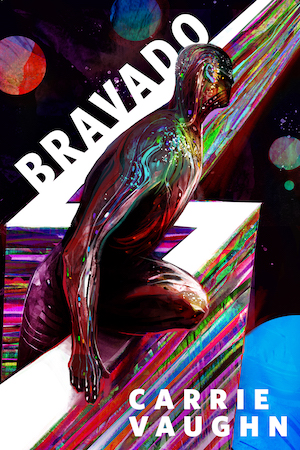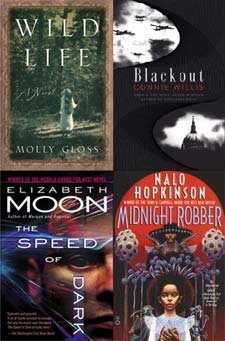Niall Harrison of Torque Control has been hosting an interesting discussion about why so little science fiction by women is published in the UK. This started with Tricia Sullivan talking about why so few women win the Clarke Award, which is for the best science fiction (not fantasy) published in the U.K., and went on from there.
British publisher Gollancz has published a set of “science fiction future classics” which do not contain any books by women. I’m sad to see this, as I imprinted on Gollancz’s yellow-jacketed SF line when I was a teenager and have always felt fond of them. Now Niall’s interested in what people think are the best ten science fiction novels written by women between 2001 and 2010—as if the future classics list was to be all female, instead of all male.
In the Torque Control discussion some people said women just aren’t interested in SF because science is too hard for girls, which is just teeth-grindingly annoying as well as demonstrably untrue. Other people said that women just weren’t writing top class stuff—and I’ve also seen the opposite claim that only the outstanding women were being published.
There does seem to be a problem, and it does seem to be with science fiction. As well as women SF writers not being published in the UK, this decade has seen a shift towards fantasy. I think it may be a general shift and there’s less science fiction than fantasy being written by people of all genders and in all countries, but it seems most marked among women. Lois McMaster Bujold’s work this decade has all been fantasy. Alison Sinclair, who has quite astonishing scientific qualifications, has switched to dark fantasy. Le Guin’s full-length work this decade has all been fantasy. If you look at the female Hugo nominees for this decade only two of them are science fiction rather than fantasy—Nalo Hopkinson’s Midnight Robber and Connie Willis’s Passage.
There are still plenty of women writing science fiction, especially if we don’t limit ourselves to what’s been published in Britain. Niall’s challenge is to limit ourselves the best ten. These are my personal choices:
- C.J. Cherryh – Explorer
- Julie Czerneda – In The Company of Others
- Molly Gloss – Wild Life
- Nalo Hopkinson – Midnight Robber
- Rosemary Kirstein – The Language of Power
- Karin Lowachee – Warchild
- Chris Moriarty – Spin State
- Elizabeth Moon – The Speed of Dark
- Susan Palwick – Shelter
- Connie Willis – Blackout
Please make your own lists. Please limit it to science fiction—I appreciate that there are edge cases, and that’s fine, but I reserve the right to roll my eyes at anyone suggesting Susanna Clarke or J.K. Rowling.
Jo Walton is a science fiction and fantasy writer. She’s published eight novels, most recently Half a Crown and Lifelode, and two poetry collections. She reads a lot, and blogs about it here regularly. She comes from Wales but lives in Montreal where the food and books are more varied.










